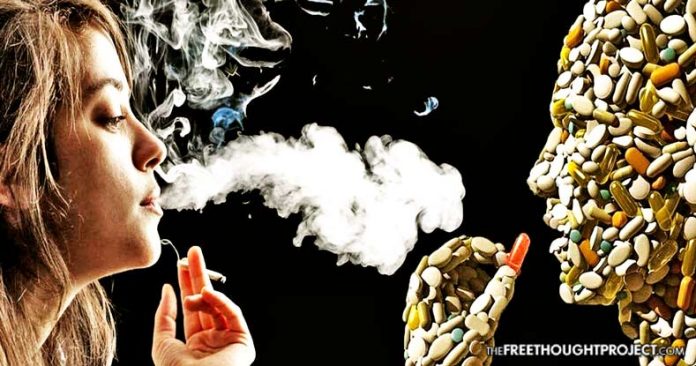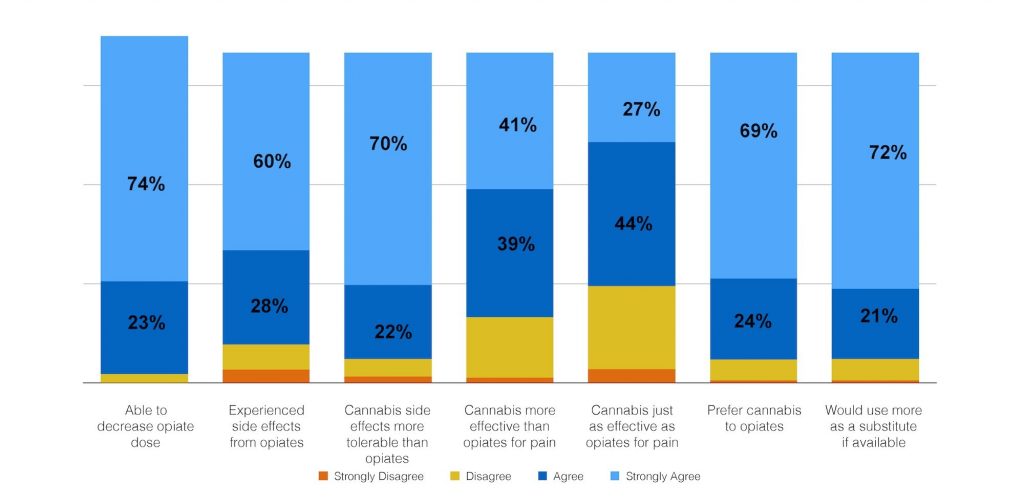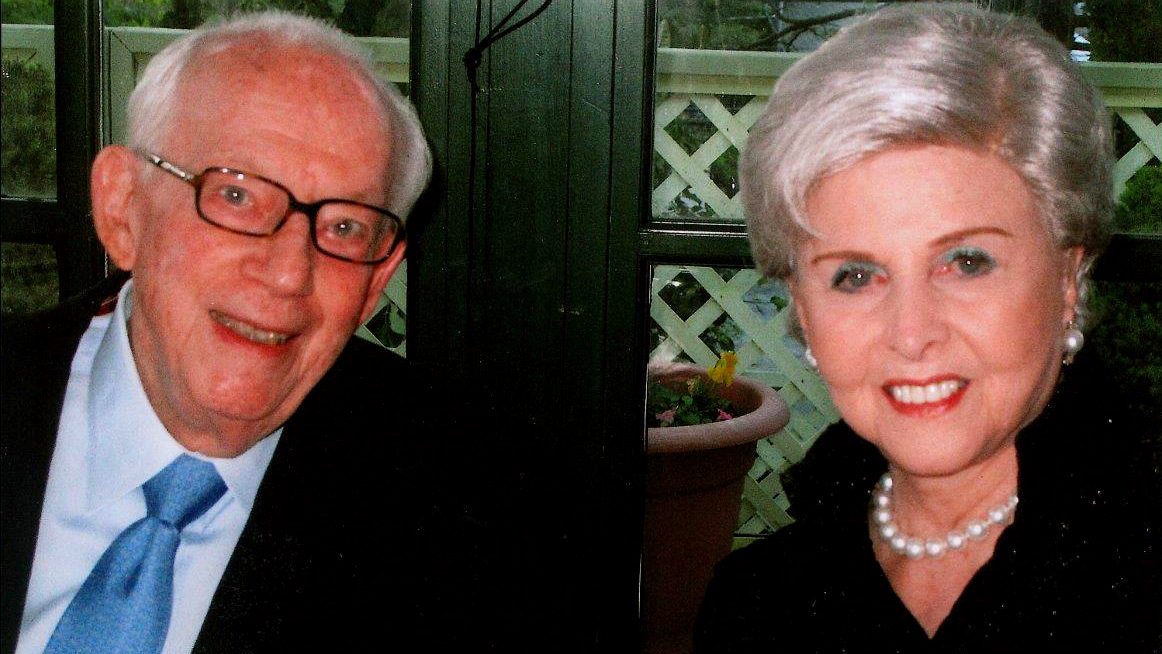Big Pharma Wants a Monopoly On One of Weed's Key Medicinal Compounds
Corporate lobbyists in more than 20 states are currently pushing to make sure the pharmaceutical industry has the only legal supply of CBD.
Melissa Mentele,a 40-year old mother of three, worked in healthcare for 20 years until she suffered a catastrophic injury while helping an Alzheimer's patient out of bed, later developing a rare, "devastating" chronic pain condition called
RSD/CRPS. After finding that medical cannabis worked wonders for her pain relief without the "dangerous and debilitating" side effects of prescription pills, she helped found
New Approach South Dakota, a donor-funded, volunteer-staffed nonprofit that advocates locally for medical cannabis.
A regular attendee at any statewide meeting on the subject, Mentele noticed something seriously awry this legislative session when she arrived at the statehouse for a hearing on a bill that would allow patients with a doctor's recommendation to legally access
cannabidiol (CBD), a non-psychoactive medicinal compound found in cannabis.
"Every attempt to pass a medical cannabis law in South Dakota has previously been met with a very heavy law enforcement presence," Mentele tells me.
"Even an extremely limited CBD bill last year, where we had parents of severely ill children in there crying and begging for access, brought out about 40 police officers and our Attorney General's office—all in opposition. So I knew something was up this year when we arrived for the committee meeting and the parking lot wasn't full of cop cars from every county in our state."
Initially, Mentele hoped the powers-that-be had finally educated themselves on the subject and come to their senses. But that wasn't it, exactly.
Read more:
Big Pharma's Dirtiest Dealers
Instead, she discovered that three paid lobbyists for
GW Pharmaceuticals and its American subsidiary
Greenwich BioSciences had came prepared to push for a key amendment.
The original South Dakota Bill
SB 95 would have exempted CBD from the state's definition of cannabis, moving it from a Schedule I to a Schedule IV drug, thus clearing the way for CBD products to be legally sold. The GW-backed amendment clarified that these changes would apply only to products with FDA approval.
Not surprisingly, GW Pharmaceuticals has just such a drug in the pipeline.
Epidiolex, a "proprietary oral solution of pure plant-derived cannabidiol," has already been given to epileptic children in the US as part of a
federal investigative study documented recently in the
New England Journal of Medicine. And the company plans to submit Epidiolex "mid-2017" for full FDA approval.
Since no other pharmaceutical company has a CBD drug anywhere close to market, and the wide range of CBD products already available in medical marijuana states lack FDA approval, if the bill had passed with that amendment intact, patients in South Dakota would have been subjected to a virtual CBD monopoly.
"GW wants to be the only CBD product allowed in South Dakota," Mentele says. "That makes me very angry."
More ominously, The Great CBD Battle of South Dakota appears to be but the opening salvo in a nationwide war between GW Pharmaceuticals and traditional medical cannabis providers.
*
The landmark study published by
The New England Journal of Medicine last month showed for the first time that in a clinical trial CBD extracted directly from cannabis plants sharply reduced seizures among children with a rare form of epilepsy.
But parents with children suffering from Dravet's Syndrome and many other serious illnesses have been pushing for access to the "miracle drug" since 2013, when Dr. Sanjay Gupta's
Weed documentary debuted on CNN. The much-hyped, hour-long special told the story of
Charlotte Figi, a 6-year-old girl who suffered 300 grand mal seizures every week, until non-psychoactive CBD-rich cannabis oil proved 99 percent effective in stopping them.
Immediately after
Weed aired, demand for CBD spiked, with hundreds of families literally
uprooting their lives and moving to Colorado to legally access the herbal treatment. But that seeming "overnight" sensation was actually many decades in the making.
In the mid-1960s, a team of Israeli scientists first isolated tetrahydrocannabinol (THC), CBD, and other cannabinoids. As the part of the plant that gets you high, THC naturally garnered the bulk of attention, while CBD languished in relative obscurity, including among US government-backed researchers tasked with demonstrating marijuana's harms (never benefits!), and pot
aficionados looking to get lit.
It took Dr. Geoffrey Guy, a British pharmaceutical researcher and serial entrepreneur, to fully recognize the compound's unique potential. Not only did CBD exhibit promising therapeutic benefits in early lab tests, but its lack of a high offered a foot in the door with skeptical lawmakers.
CBD languished in relative obscurity, including among US government-backed researchers
By 1998, as founder and chairman of GW Pharmaceuticals, Guy was growing thousands of cannabis plants—with full approval from the British government—in a series of heavily secured glass houses at an undisclosed location in Southern England.
"He got the go-ahead by convincing the British Home Office that CBD could negate the psychoactivity of THC, and that cannabinoids could be ingested by means other than smoking," Fred Gardner, publisher of
O'Shaughnessy's , a long-running journal covering the latest advances in cannabis medicine, tells me.
At the time of GW's founding almost all marijuana available on the black market offered only minuscule amounts of CBD, largely because the compound effectively diminishes the prized psychoactive effects of THC, which led underground growers to unwittingly breed it out of the cannabis gene pool.
That is, at least until 2010, when Gardner helped form
Project CBD, and started working with medical cannabis cultivators, testing laboratories and dispensaries to identify and disseminate remaining heirloom varieties with appreciable amounts of CBD.
As CBD supply subsequently grew, so too did remarkable anecdotal reports of its medical efficacy for a wide range of ailments. Charlotte Figi's parents first learned of highly-concentrated CBD oil not from the medical establishment, but by watching
Weed Wars, a Discovery Channel series about a cannabis dispensary that was an early adopter of the treatment for pediatric patients.
GW Pharmaceuticals, meanwhile, has spent many years and untold millions of dollars developing
Sativex, a fully plant-derived sublingual spray with a 1:1 ratio of THC and CBD that's currently available in sixteen countries, but still hasn't won FDA approval as a prescription drug in the United States. So while
The Hemp Business Journal estimates that the US market for CBD is currently a $200 million annual industry, GW has yet to make a sale.
Dr. Guy, however, appears to be playing the long game.
*
Melissa Mentele first went public with her objections in
an exposé published by
Leafly, a cannabis media company, which described how South Dakota Attorney General Marty Jackley—"one of the most powerful figures in state politics"—sat silently behind the GW lobbyists during that fateful hearing, presumably in a show of support for the company and the amendment.
Jackley had previously strongly opposed
any move toward cannabis legalization, in any form, including a year ago during debate on a CBD bill that Mentele describes as "far more restrictive."
Neither GW Pharmaceuticals nor Marty Jackley responded to my requests for comment. But after the
Leafly story posted, GW did issue a
written response that read in part:
None of GW's work involves opposing "medical marijuana" or "CBD access." GW's sole focus is on creating a pathway for our medicine, once approved by FDA…Greenwich Biosciences/GW is not creating a monopoly. Rather, we are blazing a trail for any other CBD prescription medications that may follow since these regulations would not be specific to GW.
The statement also points out that GW "is currently providing Epidiolex without cost to over 1,200 patients through compassionate use programs." Fred Gardner of
O'Shaunnesey's adds that "GW providing plant extracts to scientists" is what broke the US federal government's
"monopoly on cannabinoid research." He speculates that the compound's incredible therapeutic potential may well have remained wholly obscure to this day if not for the company's efforts.
But carefully parsed, the GW statement only denies seeking a monopoly against other "prescription medications" (i.e. FDA-approved drugs like Epidiolex). Meaning under the amendment, South Dakota would still ban myriad CBD products already available in many other states. Even though they
cost far lessthan Epidiolex, and are potentially more effective for patients, since in addition to CBD those "full spectrum" cannabis extracts also contain small amounts of THC and other medicinal components of the plant.
"While science has not yet shown the exact role or mechanism for all these various compounds," Dr. Gupta
has written, "evidence is mounting that these compounds work better together than in isolation.'"
So really the best argument you can make for Epidiolex is that it's produced to pharmaceutical standards and, if FDA approved, would be federally regulated like any other prescription drug. No small thing if you're planning to give it to a toddler with a severe seizure disorder. But something bigger certainly seems to be at play.
*
Ultimately, after pressure from local medical cannabis advocates, the GW-backed amendment was scaled back and Senate Bill 95 was passed and signed into law by South Dakota Governor Dennis Daugaard. In a "nobody wins" outcome, according to Mentele, patients in the state will still have to wait for FDA approval of Epidiolex to gain legal access to CBD, but at least the subsequent move of CBD from Schedule I to Schedule IV will not be limited to "FDA-approved drugs"—thus preventing a monopoly.
In the meantime, however, families with desperately ill children are stuck in limbo while waiting for Epidiolex's approval, which could take a year or longer. Even more ominously, as
Leafly reported, GW has "contracted with lobbyists in at least 22 states for the 2017 legislative season."
According to Justin Strekal, Political Director of the
National Organization for the Reform of Marijuana Laws, their efforts may not only deny patients immediate access to CBD, they also threaten to significantly delay the implementation of any kind of cannabis reform.
"As GW and their lobbyists go door-to-door selling lawmakers on the wonders of their proprietary product," Strekal tells me, "it gives those legislators the political out to say 'we did something,' when they really didn't."
Case in point, in Georgia, back in 2014, a CBD access bill backed by many parents of severely ill children
"got mired in politics," according to WBS-TV Atlanta, and died in the final hours of that year's legislative session. Soon after, Governor Nathan Deal "
announced a plan to pave the way for clinical trials" on CBD in the state to be sponsored by GW Pharmaceuticals.
Local activists believe significant contributions from Big Pharma to Governor Deal and the two lawmakers who chair the Health and Human Services Committee influenced them to kill a bill "that would have granted immunity to parents of kids with severe seizure disorders who brought non-FDA-approved cannabis oil back from states where it's legal."
Three years later, the situation remains so dire that highly conservative Georgia state representative Allen Peake has taken to running
an underground CBD distribution ring out of his office. The cannabis products arrive illegally from Colorado (Peake claims no knowledge of how they arrive) and then are distributed to hundreds of pediatric parents across the state.
For Melissa Mentele, meanwhile, the first CBD battle in South Dakota may be a hard-fought draw, but the war is just starting. And she won't be taken by surprise again. "Cannabis patients and caregivers have organized and fought for decades for the government to look at cannabis as a treatment option. Nobody did until hundreds of patients bravely shared their stories," she said.
"So we as a community have done the work for them, and now Big Pharma wants to swoop in and use an unfair monopoly and an inferior product to profit off the backs of catastrophically ill and dying people. It is disgusting."
I can't say it any better than the last line above.....







